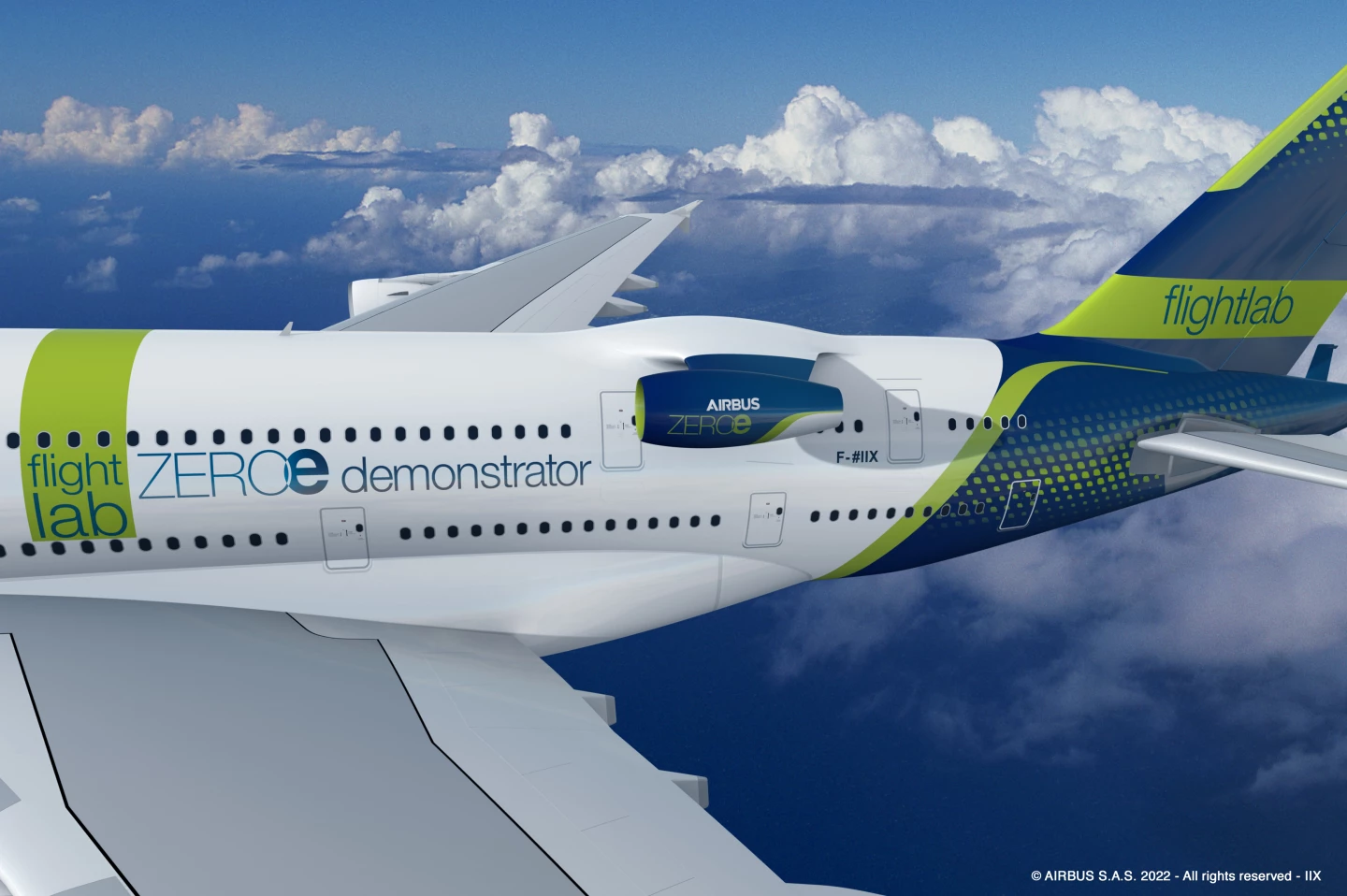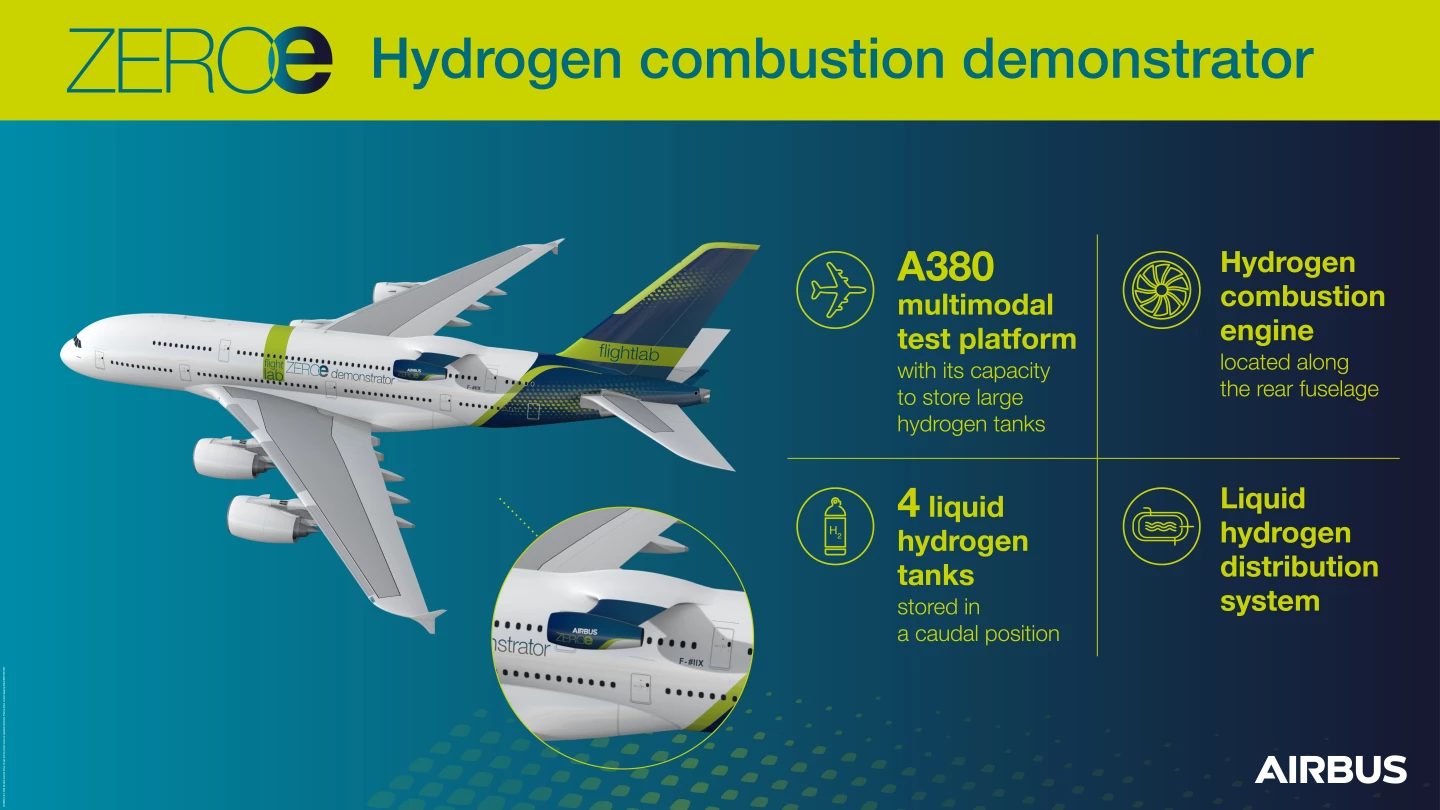Airbus, in partnership with CFM International (a joint company of GE and Safran Aircraft Engines), is developing an A380 flying testbed called the ZEROe Demonstrator to examine how hydrogen combustion can be used to power turbofan jet engines.
From an environmental point of view, hydrogen is an attractive alternative to conventional jet aviation fuel for an aerospace sector that has pledged to go carbon-free by 2050. In its gaseous form it's almost as easy to handle as natural gas, it burns readily and relatively clean, and leaves behind only water and 90 percent fewer nitrogen oxides emissions than kerosene.
At a superficial glance, it seems like an ideal substitute, but a closer look shows that there's a long way to go before we see hydrogen-burning jetliners taxiing up to the gate. For example, it would be easy to say that it does away with nasty fossil fuels, but most of the hydrogen produced on an industrial scale comes from petroleum through the steam-methane process. So using hydrogen as a green fuel would mean a huge shift in production to alternatives like biomass or electrolysis of water using non-fossil-fuel energy sources, and all of the infrastructure issues such a shift would entail.

If that wasn't enough, hydrogen has other problems. Though it has 2.5 times the specific energy of kerosene it has a much lower energy density and occupies four times the volume. This means that a one-for-one swap of hydrogen for conventional fuels would mean an aircraft could only fly a quarter as far.
To offset this, the hydrogen would have to be turned into a cryogenic state, where the it's converted to a liquid at -420 °F (-250 °C) that would require it to be carried in specially insulated tanks that would be four times as large as current tanks. This would require aircraft that would have a bulbous appearance or be designed with a blended body where the wing and the fuselage merge into one.
This introduces its own problems because these hydrogen planes would have a larger surface-to-volume ratio, which means more aerodynamic drag and reduced fuel efficiency. However, the hydrogen would be lighter than conventional fuel, which would introduce a trade off.
The alternative might be to simply live with a shorter range, but this is a problem because producing and handling cryogenic hydrogen is extremely dangerous and expensive, so it would be preferable to need as few refueling locations as possible along any given route.

On the other hand, it would be possible to design a hydrogen-powered plane that retains most of the conventional control systems and basic jet engine configurations, so certification wouldn't pose the major problem that an entirely new class of plane would entail.
In addition, using hydrogen in jet engines isn't a new idea. The first German jet engine made in 1937 used hydrogen for ground tests, and a Martin B-57B Canberra bomber flew for 20 minutes on hydrogen in 1957. Since then, there have been a number of studies into using hydrogen as an alternative form of jet fuel. A number of auto manufacturers are also exploring the potential of hydrogen combustion engines to power vehicles closer to the ground.
Now, Airbus and CFM International are working on a demonstrator for a hydrogen jet engine that is expected to fly in the next few years and could lead to the introduction of a zero-emission aircraft by 2035.
Under the new agreement, Airbus will provide an A380 aircraft for conversion into the ZEROe Demonstrator flying testbed with caudal hydrogen tanks installed in the fuselage and will determine the system requirements for the test engine, which will be a GE Passport turbofan with a combustor modified by CFM to burn hydrogen.
The new engine will not be powering the A380, which will use conventional engines. Instead, the hydrogen engine will be mounted on the fuselage toward the stern. This will allow the engineers to monitor the emissions of the hydrogen engine while in cruise mode without interference from the engines mounted under the wings.
"This is the most significant step undertaken at Airbus to usher in a new era of hydrogen-powered flight since the unveiling of our ZEROe concepts back in September 2020," said Sabine Klauke, Airbus Chief Technical Officer. "By leveraging the expertise of American and European engine manufacturers to make progress on hydrogen combustion technology, this international partnership sends a clear message that our industry is committed to making zero-emission flight a reality."
The video below introduces the ZEROe concept.
Source: Airbus







